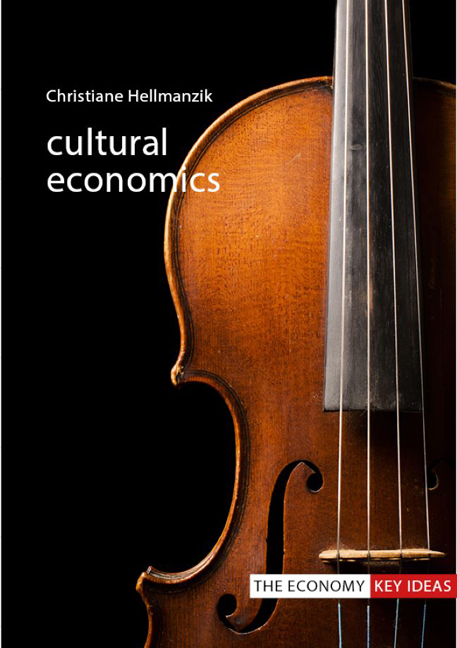Book contents
- Frontmatter
- Contents
- Acknowledgements
- 1 Introducing cultural economics
- 2 Markets, prices and agents
- 3 Society and culture: public provision and institutional aspects
- 4 Demand for culture
- 5 Artists, superstars and creativity
- 6 Quality in the arts and culture
- 7 The organization of cultural industries
- 8 The internet’s impact on cultural sectors
- 9 Globalization’s impact on cultural sectors
- 10 Conclusion
- References
- Index
2 - Markets, prices and agents
Published online by Cambridge University Press: 20 December 2023
- Frontmatter
- Contents
- Acknowledgements
- 1 Introducing cultural economics
- 2 Markets, prices and agents
- 3 Society and culture: public provision and institutional aspects
- 4 Demand for culture
- 5 Artists, superstars and creativity
- 6 Quality in the arts and culture
- 7 The organization of cultural industries
- 8 The internet’s impact on cultural sectors
- 9 Globalization’s impact on cultural sectors
- 10 Conclusion
- References
- Index
Summary
When thinking about the market for cultural goods and services it is important to understand the types of goods and services to be analysed, their properties and the key features of the industry in which they are produced and the demand for them. Together, these ingredients constitute the market, which brings about the quantity as well as price at which the market clears.
By and large we can divide the cultural sector into the following main areas: (a) performing and visual arts, which encompasses theatre, dance, music and opera; (b) the audio-visual sector, which includes film, games and photography, literature and design of all types; and (c) architecture and heritage sites. Each of these sectors incorporates individuals, private firms and public organizations that engage in the market to offer and consume art experiences of various types.
Types of goods and services
Many of these cultural goods and services are in fact what we call experience goods, which means that it is hard to assess their quality and the enjoyment they will bestow before purchasing and “experiencing” them. In other words, the exact value the good offers to the consumer can be ascertained only after its consumption. In addition, we learn to appreciate these types of goods the more often we consume them. In essence, this means we develop a taste for sculptures or splatter movies over time with every item consumed. The main preventive hurdle is experiencing them in the first place, as the pleasure or utility they will give us is uncertain.
This uncertainty derives from what economists call information asymmetry. In the case of the cultural sector, this means that consumers do not know the quality of the good before purchasing it, whereas the producers do know the quality of their product. For producers, the asymmetry is reversed: they know the quality but they do not know the preferences of consumers. Therefore, information is distributed unequally between market participants. Moreover, for experience goods we can gain knowledge from others through their reviews or word-of-mouth comments. This is different from a typical consumption good, such as an apple, in that you usually know what you get before you buy and would not spend a lot of time scouring the web for information on it.
- Type
- Chapter
- Information
- Cultural Economics , pp. 13 - 26Publisher: Agenda PublishingPrint publication year: 2020



